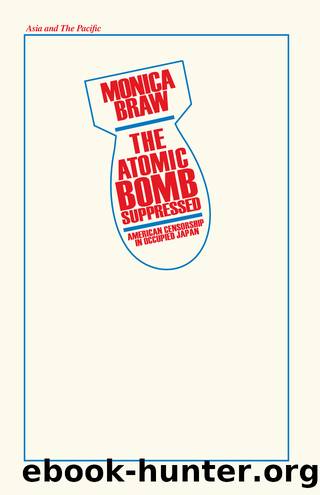The Atomic Bomb Suppressed: American Censorship in Occupied Japan: American Censorship in Occupied Japan by Monica Brau

Author:Monica Brau [Brau, Monica]
Language: eng
Format: epub
Tags: Political Science, General
ISBN: 9781351546126
Google: WCwxDwAAQBAJ
Goodreads: 35635716
Publisher: Routledge
Published: 2017-07-05T00:00:00+00:00
the world will have manufactured atomic bombs and will possess them. At the same time we must conclude that these countries will use the atomic bombs with one another in the event of another world war. The bombs will be dropped everywhere, causing terrible damage. . . . This would mean the destruction of mankind and the destruction of civilization."36
More positive views of the future were also suppressed: "The discovery of the atomic bomb will make the outbreak of war difficult. The international efforts to avoid wars will be accelerated and Japan will possibly become one of the first-class countries without any armies at all."37 Why this was determined to be incitement to unrest is not readily apparent, unless the thought of Japan having no army was regarded as angering old militarists. The new constitution, created by GHQ, denounced war and in effect denied Japan offensive military forces.
The peace movement, which centered on the anniversary ceremonies in Hiroshima, was followed with interest by the censors. An article in the Tokyo newspaper Yomiuri in June 1948 on the necessity of starting a world peace movement in Hiroshima was suppressed.38 But a few weeks later the news agency Jiji sent out another story about the worldwide peace movement called "No More Hiroshimas." CCD checked with the Civil Information and Education Section, which took exception to publicizing the movement in the Japanese press. It was particularly opposed to the references to repentance for having dropped the atomic bomb. The deputy chief called the peace movement an acute problem for CIE and added that it was causing much trouble. He recommended suppression of the article. G-2 was not quite so categorical, for practical reasons: Jiji had already published the story, although the censors had marked it "Hold," and if action were taken now, perhaps the Japanese sponsors of the peace movement would inform the American sponsors. The result would be bad publicity for scap. It would be best to keep the story out of the papers altogether, but because this seemed difficult, G-2 recommended that it be passed.39
The question of peace movements continued to disturb CIE. It was worried about possibly objectionable stories that might appear in connection with the anniversary in Hiroshima. The ceremonies themselves were also a worry. There was reason to believe that material had been written that included calls for American atonement for the Hiroshima bombing. But because demonstrations and speeches did not fall under the jurisdiction of censorship CCD did not intend to take any special measures, such as sending a representative to Hiroshima.40
When the ceremonies were over, the Analysis and Research Division of the Civil Intelligence Section analyzed the content of articles written during the three-day Peace Festival. It noted that Yomiuri had carried an article by the nestor of Japanese nuclear physicists discussing whether atomic power would bring peace or misery to the world. Asahi had reviewed the progress of rehabilitation in Hiroshima and Nagasaki. The third major paper, Mainichi, had expressed hopes that the Japanese would be "the first and the last people who knew the power of the atomic bomb on the battlefield.
Download
This site does not store any files on its server. We only index and link to content provided by other sites. Please contact the content providers to delete copyright contents if any and email us, we'll remove relevant links or contents immediately.
| China | India & South Asia |
| Japan |
Fanny Burney by Claire Harman(26603)
Empire of the Sikhs by Patwant Singh(23086)
Out of India by Michael Foss(16853)
Leonardo da Vinci by Walter Isaacson(13337)
Small Great Things by Jodi Picoult(7144)
The Six Wives Of Henry VIII (WOMEN IN HISTORY) by Fraser Antonia(5516)
The Wind in My Hair by Masih Alinejad(5095)
A Higher Loyalty: Truth, Lies, and Leadership by James Comey(4964)
The Crown by Robert Lacey(4817)
The Lonely City by Olivia Laing(4802)
Millionaire: The Philanderer, Gambler, and Duelist Who Invented Modern Finance by Janet Gleeson(4479)
The Iron Duke by The Iron Duke(4357)
Papillon (English) by Henri Charrière(4274)
Sticky Fingers by Joe Hagan(4201)
Joan of Arc by Mary Gordon(4115)
Alive: The Story of the Andes Survivors by Piers Paul Read(4033)
Stalin by Stephen Kotkin(3969)
Aleister Crowley: The Biography by Tobias Churton(3640)
Ants Among Elephants by Sujatha Gidla(3467)
